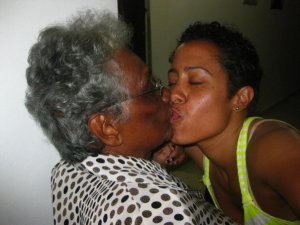Bloody Knuckles


Many of my family members are what most Dominicans would pejoratively consider campensino, or farm people. They cultivated the earth because they had a connection to her that many, today, pay thousands of dollars to remember. Consciously, or not, my family understood that they belonged to a force larger than the mountains they gazed into when the sun seemed to be assertively and protectively blanketing them with his glare.
Mi familia are simple folk who taught me that the first thing you do in the morning, the minute you open your eyes, is to perform the sign of the cross, or presinarme, and give thanks for another day. Collectively, the elders in my family do not have the level of education that three of the younger generations in the US do. Ironically, though, they have more wisdom then those with professional degrees, combined, because their knowledge is beyond this realm.
Magua is the name of the village, in the Dominican Republic, where my family built castles of memories and fostered a connection to each other that amazingly remains 40, 50, 70 years later. I’ve also learned that Magua is the main villain in the book The Last of the Mohicans. Magua, the village that I romantically imagine in my heart’s mind is also the same name that many cringe at. The contradictions of this reality are ironic.

Magua, how I wish I could close my eyes and see you. See you in 1955, when my mother was 10, mama Cilia was 17 and my family adored you for the self-determination and abundance you blessed them with.
The women in my family are warriors. They have strong backs and calloused hands. Their fingers wove dried palm leaves into baskets; their knuckles bled as they washed other peoples’ clothes so that they could put clothes on their own children’s back. They are queens in a world that taught them to believe they were ugly, dark, less than. In short: a woman. The women in my family are gorgeous human beings. Their resilience continues to baffle me in my 30s and it amazed me in my teens. The women in my family teach me that in spite of our flaws, we have the right to believe and affirm that we are made of the same stuff that stars are made of.

Mama Cilia, gracias. A fierce guerrera who feared no one and nothing. A mis-understood, beautiful, resilient Afro-Indigenous Queen whose blood and vigor runs through me. Mama Cilila, madre. La quiero. La aprecio. Gracias, gracias, gracias. I am moved by you. By the grace you sustained as life seemingly threw one curve ball after another. Please teach me to be like you. Mama, you forgave so easily and spoke so freely. Please, show me your ways. I am humbled by your gifts. Your transition is not the end. It is the beginning of a new spiritual relationship that you and I are cultivating. I am saddened by the lack of your physical presence but inspired in knowing that you are always with me. I truly believe that.
'Cion Mama
Tua N'tur